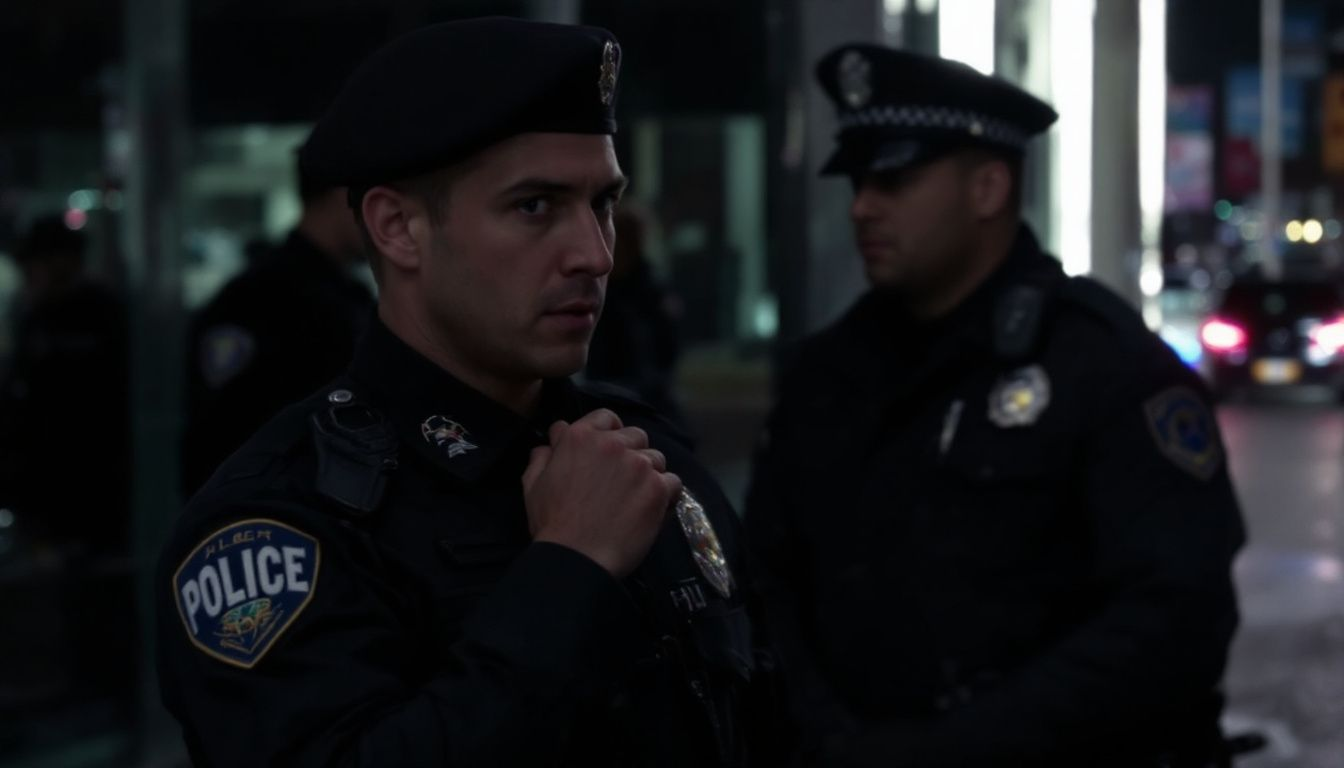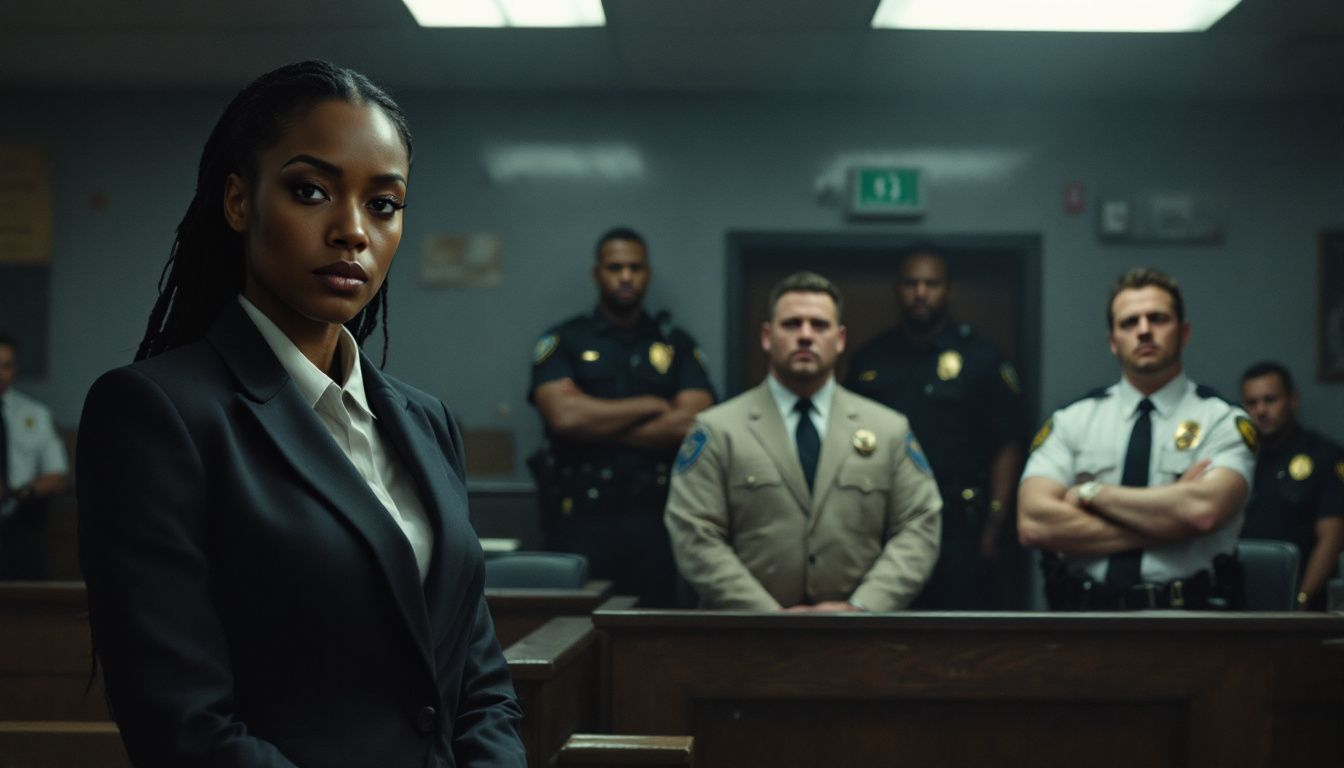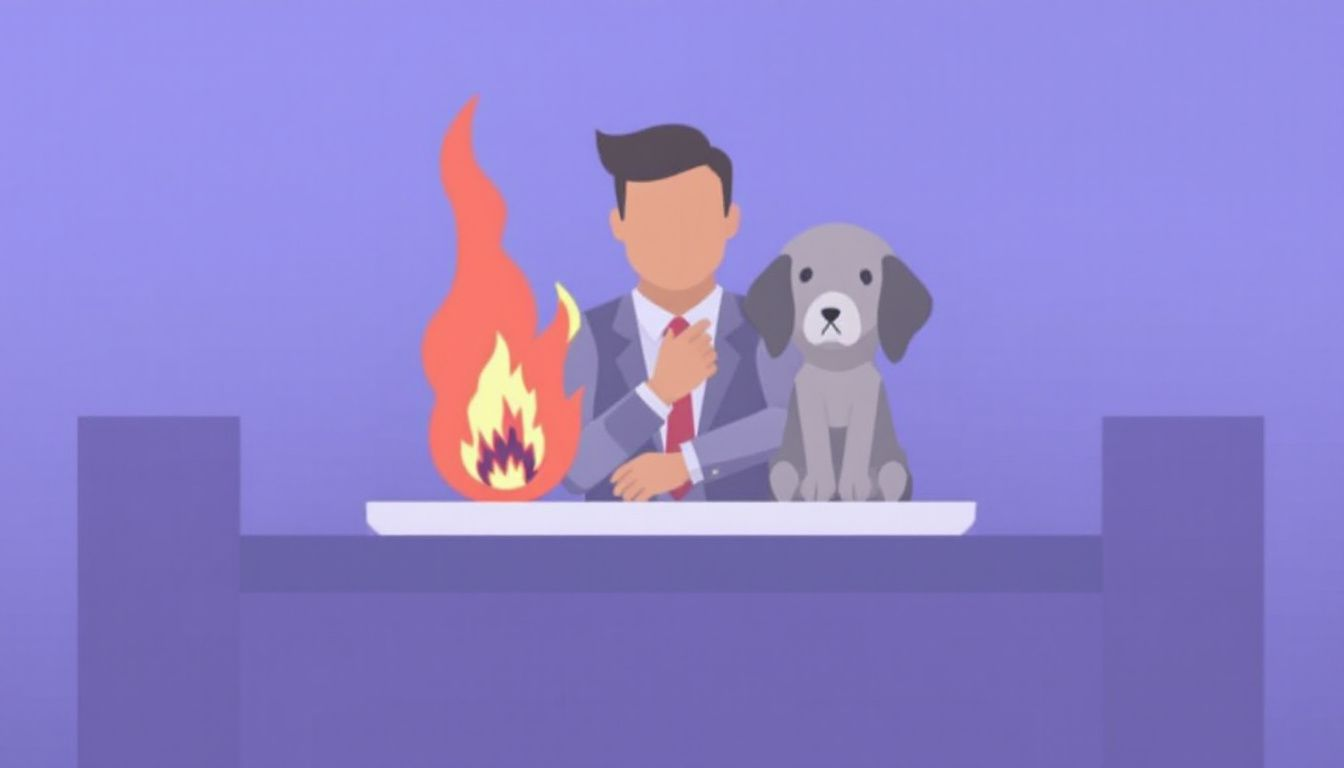Have you experienced police misconduct? Police misconduct lawyers can help you get justice. This article covers what these lawyers do, how they can assist you, and the necessary steps to take. These lawyers are experts in civil rights law and have a track record of obtaining substantial settlements and verdicts for their clients.
Key Takeaways
- Police misconduct involves unlawful acts by officers, including excessive force, racial profiling, and unlawful detentions, leading to significant emotional and physical harm for victims.
- Victims of police misconduct have various legal recourse options, such as engaging specialized attorneys and pursuing lawsuits, which can result in compensatory and potentially even punitive damages.
- Qualified immunity often protects police officers from liability, complicating accountability for constitutional rights violations, yet Section 1983 allows victims to seek justice through civil rights lawsuits.
Understanding Police Misconduct

Misconduct by police includes a variety of illegal and improper actions carried out by law enforcement officers. Such conduct can breach constitutional rights at both the state and federal levels, eroding confidence in the integrity of those tasked with upholding the law. Police misconduct manifests in various forms like excessive force, engaging in racial profiling, or carrying out illegitimate detentions, all causing significant harm to those affected.
The repercussions of such behavior by officers are substantial and far-reaching. Victims not only suffer physical injuries but also face long-lasting emotional and psychological distress that may fundamentally change their lives. It is essential to acknowledge these different expressions of police misconduct to appreciate why legal measures must be taken to pursue justice for victims and ensure culpable police members are held responsible for their actions. Lawsuits are often directed against police departments for various violations, including excessive force and wrongful arrests.
What Constitutes Police Misconduct?
Law enforcement officers may engage in a range of improper behaviors that violate the rights of individuals, which is collectively known as police misconduct. Police brutality stands out among these actions for its severity, involving situations where law enforcement uses force beyond what is needed to manage an incident, leading to dire outcomes like unwarranted shootings or extreme physical assaults on victims. Such brutality can also result in wrongful death, highlighting the severe consequences of such misconduct.
Racial profiling constitutes another facet of police misconduct wherein officers single out people for scrutiny based solely on their race rather than any tangible signs of illegal activity. This practice along with wrongful detentions—where individuals are held without sufficient grounds—are not only breaches of legal norms but also factors that diminish public confidence in the effectiveness and integrity of the police.
The Impact of Police Misconduct on Victims
Victims of police misconduct experience significant and varied effects. Those who have endured mistreatment by the police frequently face emotional turmoil and persistent psychological distress, with ensuing anxiety that can precipitate enduring mental health complications, thereby impacting their life quality and trust in law enforcement.
Such victims typically pursue different forms of restitution for the physical harm they’ve sustained as well as the emotional anguish experienced. This compensation often encompasses both compensatory and punitive damages designed to offer monetary support while also ensuring accountability for culpable officers.
For victims to attain a sense of resolution and maintain societal confidence in legal institutions, it’s crucial they engage with justice processes.
Legal Recourse for Victims of Police Misconduct

Victims of police misconduct have several legal options at their disposal to pursue justice. Consulting with attorneys specialized in police misconduct is vital for comprehensively understanding the intricacies involved in these matters. Such lawyers are proficient at managing incidents involving police brutality, civil rights infringements, and various other types of improper conduct by law enforcement officers, assuring that victims obtain the advocacy they need.
Securing an adept lawyer who specializes in police misconduct is essential for taking effective legal measures. Civil rights attorneys dedicate themselves to advocating on behalf of those who suffer from unlawful acts and discrimination by the police, delivering focused legal representation aimed at safeguarding their clients’ civil liberties. Victims can gain access to crucial advice and backing by reaching out to seasoned law firms specializing in this area. Additionally, holding municipalities accountable for civil rights violations by their employees is crucial, as highlighted by the Monell case, which allows individuals to seek accountability from municipal entities when such violations align with official policies or customs of the organization.
Filing a Police Misconduct Lawsuit
To initiate a lawsuit for police misconduct, the pivotal first step is for victims to compile evidence such as injury photos and incident reports. It’s essential to maintain comprehensive records of the event that incorporate details like the badge numbers and names of officers involved in order to construct a compelling case.
The collection of witness statements plays a crucial role in corroborating allegations against police officers. Securing contact information from witnesses and documenting their testimony strengthens civil rights claims. Partnering with adept civil rights attorneys allows victims to understand these procedures better and consider legal action thoroughly.
Compensation and Settlements
Victims who have suffered at the hands of police misconduct can seek various forms of financial reparation for their suffering. Such compensation can cover physical and emotional injuries as well as damage to one’s reputation. Punitive damages may be sought not only to penalize the officers involved but also to prevent similar occurrences in the future. Do bear in mind, however, that punitive damages are “bonuses” and are awarded at the discretion of the court — they are not common, and it is not reasonable to expect punitive damages to be awarded in every case.
Significant awards from police misconduct cases underscore just how much victims might receive in terms of settlements. For example, a woman improperly detained in Raleigh, North Carolina was granted $6 million due to excessive force used against her that was racially motivated. Similarly, after an incident leading to death wrongfully caused by authorities, New York City paid out $3 million demonstrating how vital it is that municipalities are held responsible for transgressions committed by their police force.
Police Officers’ Immunity and Constitutional Rights
Officers in the police force are frequently protected by qualified immunity, granting them a safeguard against legal accountability for their conduct within official capacities. Yet this protection can be withdrawn should they infringe constitutional rights. The critical equilibrium between maintaining officers’ immunity and upholding the victims’ constitutional freedoms is essential in these circumstances.
For those aggrieved by police misconduct, seeking redress through criminal proceedings or initiating civil rights litigation under Section 1983 offers an avenue to challenge offending officers legally. This discussion delves into how qualified immunity affects efforts to secure justice in cases of alleged police wrongdoing.
Qualified Immunity Explained
Emerging from the Pierson v. Ray case, qualified immunity was established to shield officers from monetary liability given that they operated under probable cause. The Supreme Court subsequently expanded this protection in Harlow v. Fitzgerald by discarding the necessity of demonstrating an officer’s good faith, thereby making it tougher to call officers to account.
Under this doctrine, police are afforded a safeguard against personal responsibility when accused of infringing upon constitutional rights—contingent on whether precedents exist for analogous incidents. This grants judges authority to make decisions regarding qualified immunity absent a determination on whether law enforcement officials have breached legal statutes, which complicates matters for victims who pursue justice through legal channels.
Violations of Constitutional Rights
Police misconduct frequently results in breaches of constitutional rights that are safeguarded by amendments like the Fourth, Fifth, and Fourteenth as stipulated in the United States Constitution. Instances such as unauthorized lethal force represent an infringement on a person’s right against unreasonable searches and seizures.
Victims can pursue civil rights litigation under Section 1983 to hold municipalities responsible when organizational policies lead to violations of constitutional rights, encompassing issues of municipal liability. Stemming from Monell v. Department of Social Services of the City of New York, these claims underscore the need to confront systemic problems inherent in both law enforcement agencies and civil rights legislation.
Examples of Civil Rights Violations by Police

Police misconduct frequently leads to the infringement of civil rights, manifesting in various harmful behaviors. Such acts range from unlawful detention and racial profiling to the application of excessive force, all violating the foundational values of equity and justice.
To grasp the severity of these transgressions, it’s crucial to consider tangible instances that highlight their impact and demonstrate why legal measures are essential for redress.
False Arrest and Unlawful Detainment
An individual experiences a false arrest when they are taken into custody without the appropriate legal grounds, which can frequently result from unlawful searches or being subjected to racial profiling. In Fayetteville, North Carolina, there was an incident where a woman was mistakenly apprehended in relation to a drive-by shooting despite the absence of either probable cause or an official warrant.
When individuals are halted and retained without any reasonable suspicion or legal reason, it constitutes unlawful detention. Such practices breach not only legal principles but also lead to substantial emotional and psychological distress for those who fall victim to them.
Excessive Force and Police Brutality
The inappropriate application of lethal force, which should be reserved only for situations presenting an imminent danger, is a form of police brutality that constitutes a grave abuse of power. Racial profiling and the overstepping use of force by law enforcement are serious breaches of civil rights.
Incidents like George Floyd’s tragic death have cast a stark light on the severe consequences resulting from unlawful police conduct. Such high-profile violations point to the critical necessity for transformative reforms in policing practices as well as stringent legal frameworks to ensure culpable officers face justice.
Cost Structure of Hiring Police Misconduct Lawyers

Victims of police misconduct can secure legal representation through attorneys who usually work on a contingency fee basis, meaning they only receive payment as a percentage of the settlement if they successfully win the case. This approach allows victims to pursue their cases without facing immediate financial strain.
It is crucial for those impacted by police misconduct to understand that most attorneys specializing in this area typically charge between 25% and 40% of the compensation awarded. Clients are only responsible for attorney fees if they achieve a positive resolution and obtain compensation.
Contingency Fee Basis
Clients are not required to pay any fees in advance with contingency fee agreements, and they only incur charges if their lawyer is successful in winning the case. This approach lowers economic obstacles for clients seeking justice.
In such agreements, attorneys earn a portion of the settlement amount as their compensation, which usually varies between 25% and 40%. This arrangement motivates lawyers to strive for the most favorable result on behalf of their clients.
Free Consultation and Case Evaluation
Attorneys specializing in police misconduct typically provide free case assessments to determine the strength of a claim. This allows individuals who have suffered from such misconduct to share their stories and gain expert legal guidance without any upfront costs. Contacting the firm for a free consultation does not create an attorney-client relationship.
Legal firms may offer no-cost evaluations, helping victims understand the possible directions and results of their police misconduct cases. Those affected can reach out to 1-800-THE-LAW2 for an obligation-free consultation with an attorney on our dedicated legal team.
How to Contact a Police Misconduct Lawyer
If you’re a victim seeking justice for police misconduct, reaching out to an attorney specializing in this field is essential. Firms like Patterson Harkavy LLP are readily available to assist those involved in cases of misconduct by the police. An adept lawyer can offer vital support and direction through the complexities of legal proceedings.
For victims aiming to safeguard their rights and hold responsible officers accountable, securing legal representation is crucial. A free consultation with a seasoned police misconduct attorney could enlighten victims about their possible legal pathways and facilitate informed steps forward.
Steps to Take After Suffering Police Misconduct
Victims of police misconduct should promptly consult a police misconduct lawyer. A free initial consultation helps victims understand their legal rights and the steps to pursue justice.
Gathering evidence and documenting the incident are crucial steps in building a strong case. Victims should call for a free case evaluation if they believe an officer abused their authority.
Contact Information for Legal Assistance
Victims of police misconduct can dial 1-800-THE-LAW2 to access a free legal consultation. This specialized service links those affected with attorneys who have expertise in handling cases of police wrongdoing, providing them with the necessary legal assistance.
It is crucial for individuals to seek prompt legal guidance when involved in incidents of law enforcement impropriety. By acting quickly, victims are better positioned to safeguard their rights and pursue justice effectively within the context of a police misconduct case.
Summary
The issue of police misconduct represents a serious concern, impacting individuals and whole communities with potentially lasting emotional and physical injuries. It is essential for victims to recognize what falls under the umbrella of police misconduct, explore their legal options, and understand the importance of attorneys who specialize in this field when striving for justice. Misconduct can range from wrongful arrests to racially motivated actions or the use of undue force by certain law enforcement members.
Accessing expert support from dedicated police misconduct attorneys equips victims with the expertise required to deal effectively with the intricacies inherent within judicial processes. Victims are empowered through understanding financial agreements such as not having upfront fees due to contingency plans and taking advantage of initial consultations offered at no cost. Pursuing accountability against culpable officers and cities is pivotal for upholding law enforcement standards and safeguarding civil liberties.
Frequently Asked Questions
What constitutes police misconduct?
Police misconduct constitutes unlawful actions or inappropriate behaviors by officers that violate individuals’ rights, undermining public trust in law enforcement.
What should I do if I have suffered police misconduct?
If you have suffered police misconduct, it is crucial to consult a police misconduct lawyer promptly to understand your legal options and gather necessary evidence.
Taking action quickly can significantly impact the outcome of your case.
How can I prove police misconduct in court?
In order to establish a case of police misconduct before the judiciary, it is crucial to compile various forms of proof including but not limited to visual recordings, testimonies from observers, and meticulous records pertaining to the event.
Possessing a robustly substantiated claim bolstered by supporting evidence can greatly improve your prospects for triumph in court.
What types of compensation can I seek in a police misconduct case?
In a police misconduct case, you can seek compensatory damages for physical injuries and emotional distress, as well as punitive damages intended to punish the misconduct.
How can I contact a police misconduct lawyer?
You can contact a police misconduct lawyer by calling 1-800-THE-LAW2, which provides a free legal consultation for such cases.
This ensures you receive expert guidance tailored to your situation.


